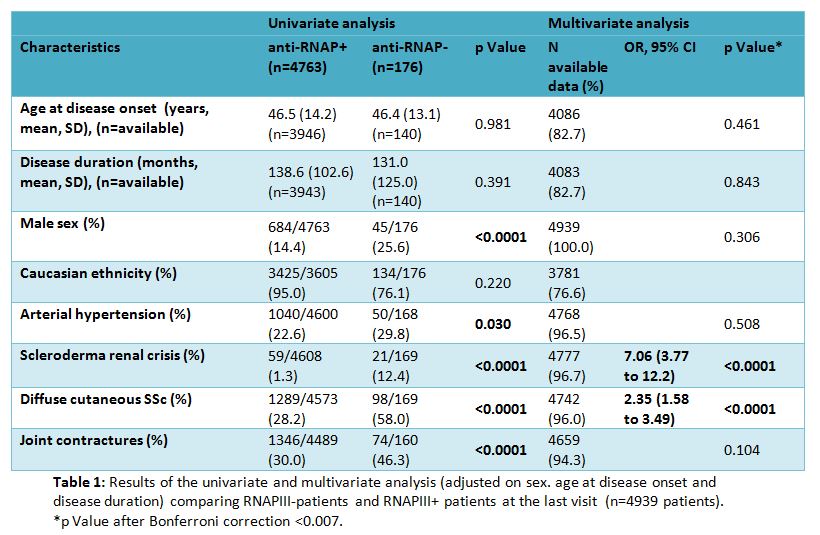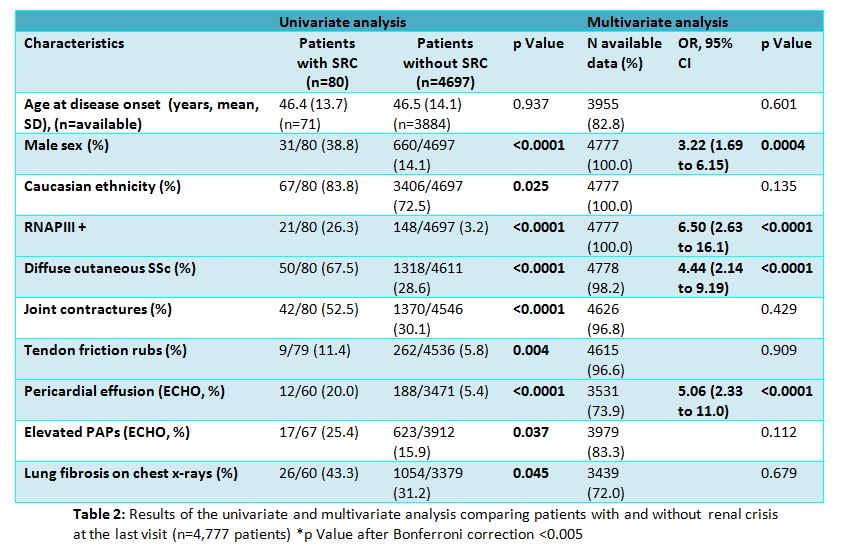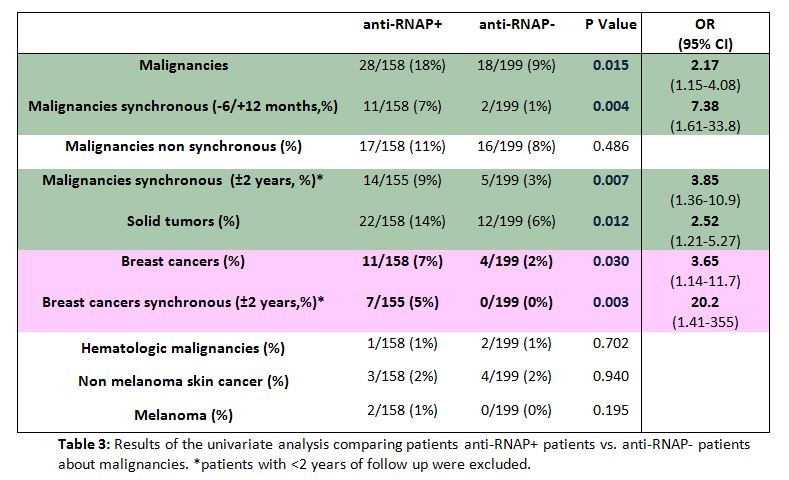Session Information
Date: Wednesday, November 11, 2015
Title: Systemic Sclerosis, Fibrosing Syndromes, and Raynaud's - Clinical Aspects and Therapeutics III
Session Type: ACR Concurrent Abstract Session
Session Time: 11:00AM-12:30PM
Increased
Frequency of Malignancies Synchronous to the Onset of Systemic Sclerosis in
Anti-RNA Polymerase III Antibodies Positive Patients: a EUSTAR Multicentre
Study
Background/Purpose:
Several clinical issues have been associated with anti-RNA
polymerase III (RNAP) antibodies in patients with systemic sclerosis (SSc), but
most data
derive from single-centre studies or relatively small positive case numbers.
Recently, a temporal relationship between the onset of SSc and malignancy has
been described in anti-RNAP+ patients. The analysis of the
large EUSTAR cohort may provide further information on the clinical
associations of this autoantibody.
Methods:
Patients from the EUSTAR database were
included when the item anti-RNAP was fulfilled in at least one visit; data were
collected from the last visit available.
In a second phase, 13 EUSTAR centers participated to a
case-control study, fulfilling a supplementary form. Anti-RNAP-negative SSc
controls were matched for sex, cutaneous subset and disease duration.
Results:
Anti-RNAP status was available in 4,986 of 11,399
patients from EUSTAR database: 223 were anti-RNAP+. After exclusion of 47 patients
with multiple autoantibody positivity, 176 anti-RNAP+ patients were compared
with 4,763 anti-RNAP-negative patients: multivariate analysis confirmed the
association of anti-RNAP with scleroderma renal crisis (SRC) and diffuse
cutaneous involvement (Table 1). A multivariate analysis was also performed to
compare patients with (n=80) and without SRC (n=4697) (Table 2).
In the case-control study 158 anti-RNAP+ and 199
anti-RNAP-negative patients were collected. We found an association of
anti-RNAP with SRC (p:0.0005), arterial hypertension (p:0.006), gastric antral
vascular ectasia (p:0.0009), and a shorter time to reach the peak of mRSS
(p:0.013, log-rank test). An increased rate of malignancies in anti-RNAP+ patients
was accounted for by the increased rate of malignancies synchronous
to the onset of SSc (Table 3). Moreover, an increased rate of solid tumors, in
particular breast cancer synchronous to the onset of SSc was observed.
Conclusion:
Anti-RNAP antibodies are an important and not always
routinely used marker in SSc. They are associated with severe clinical
manifestations and cancer, with relevant prognostic implications which should
guide the monitoring and follow-up of the patients.
To cite this abstract in AMA style:
Lazzaroni MG, Colombo E, Cavazzana I, Distler O, Dobrota R, Eisenring J, Hesselstrand R, Czirjak L, Varju C, Nagy G, Smith V, Caramaschi P, Riccieri V, Hachulla E, Romanowska-Próchnicka K, Balbir-Gurman A, Chatelus E, Araújo AC, Allanore Y, Airò P. Increased Frequency of Malignancies Synchronous to the Onset of Systemic Sclerosis in Anti-RNA Polymerase III Antibodies Positive Patients: A Eustar Multicentre Study [abstract]. Arthritis Rheumatol. 2015; 67 (suppl 10). https://acrabstracts.org/abstract/increased-frequency-of-malignancies-synchronous-to-the-onset-of-systemic-sclerosis-in-anti-rna-polymerase-iii-antibodies-positive-patients-a-eustar-multicentre-study/. Accessed .« Back to 2015 ACR/ARHP Annual Meeting
ACR Meeting Abstracts - https://acrabstracts.org/abstract/increased-frequency-of-malignancies-synchronous-to-the-onset-of-systemic-sclerosis-in-anti-rna-polymerase-iii-antibodies-positive-patients-a-eustar-multicentre-study/



